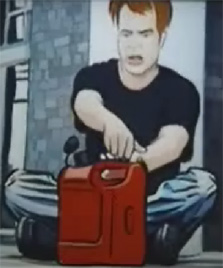Situationism in waking life
The following is an excerpt from an Essay written about the various philosophies touched on in "Waking Life" which I'm sure everyone's seen at some point - although not the deepest nor most resonant of films, lending itself more to stoner philosophy 101 than anything too indepth or exacting, i did find this little essay on the film alot of fun to read while sitting in my isolated little cubicle staring down the entire length of pine street...
Scene 4, with Kim Krizan, is about how we can overcome alienation through spiritual communion, understanding each other through words like "love." This is evidence of the more poetic, positive side of situationism, of Vaneigem's idea that we could build a cathedral of poetry and love in which to carry out our everyday lives.
Scene 14, Noise and Silence, hints at the roots of situationism in avant-garde artistic movements like Dada, surrealism, and the Lettrist International (the immediate precursor of the Situationist International, from which it emerged in 1957). A chimp pronounces a monologue into a microphone as a series of film clips (including Kurosawa's Dreams and a punk rock performance) play on a screen behind him. He talks about how art can be used to create subversive micro-societies, which open up new possibilities. Anything is still possible the talking chimp tells us, even though the world seems empty and degraded. True communication is the key. In a true situationist gesture, he eats his script at the end.
The difficult path to authenticity is made more specific in Scene 20, The Holy Moment, when filmmaker Caveh Zahedi describes André Bazin's theory that since God is in all reality, films are really attempts to capture God. When Zahedi and poet David Jewell try to have such a moment, they are partially successful; yet Jewell confesses that he slips in and out of the moment, becoming aware of the layers of reality embedded in such an attempt at real communication.
 Two scenes in Waking Life speak to the need for direct action to overcome the passivity and isolation of consumer society. In Scene 6, Self-Immolation, journalist J. C. Shakespeare douses himself with gasoline and sets himself on fire, just like a Buddhist monk in Vietnam in 1963 who was protesting the treatment of Buddhists by the Diem government. Before doing so, Shakespeare speaks of how the media uses images of death and destruction to turn us into passive observers, and how the only real freedom we're offered is the purely symbolic act of voting. Human beings want chaos: we want strife, riots, murder, and war. The trick used by the media is to paint a sad face on all these catastrophes, to pretend that they're avoidable tragedies. Yet behind this sad face is an attempt to pacify us, to turn us into puppets of the spectacle. We sit in our living rooms shedding metaphorical tears for the deaths of thousands in Bangladeshi typhoons or massacres in Rwanda, yet ten minutes later drive to the shopping mall for our daily fix of fast food and maybe a shiny new commodity or two.
Two scenes in Waking Life speak to the need for direct action to overcome the passivity and isolation of consumer society. In Scene 6, Self-Immolation, journalist J. C. Shakespeare douses himself with gasoline and sets himself on fire, just like a Buddhist monk in Vietnam in 1963 who was protesting the treatment of Buddhists by the Diem government. Before doing so, Shakespeare speaks of how the media uses images of death and destruction to turn us into passive observers, and how the only real freedom we're offered is the purely symbolic act of voting. Human beings want chaos: we want strife, riots, murder, and war. The trick used by the media is to paint a sad face on all these catastrophes, to pretend that they're avoidable tragedies. Yet behind this sad face is an attempt to pacify us, to turn us into puppets of the spectacle. We sit in our living rooms shedding metaphorical tears for the deaths of thousands in Bangladeshi typhoons or massacres in Rwanda, yet ten minutes later drive to the shopping mall for our daily fix of fast food and maybe a shiny new commodity or two.|The rest of Doug Mann's essay|




3 comments:
Hmmm. . . I've never seen that film. From reading that essay, it looks too weird for me, so I'm probably not going to see it any time soon, either!
it's weird but in a playful way, i'd say it's a fairly accessible movie actually. and even if your not picking up on what they're putting down, it's still fun to watch :)
Well, I may choose to open my mind someday. . .
Post a Comment